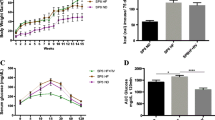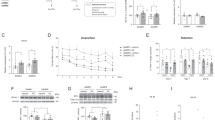Abstract
Ageing and obesity have been shown to increase the risk of cognitive decline and Alzheimer’s disease (AD). Besides, elevated glucocorticoid (GCs) levels cause metabolic stress and have been associated with the neurodegenerative process. Direct pieces of evidence link the reduction of GCs caused by the inhibition of 11β-HSD type 1 (11β-HSD1) with cognitive improvement. In the present study, we investigated the beneficial effects of 11β-HSD1 inhibitor (i) RL-118 after high-fat diet (HFD) treatment in the senescence-accelerated mouse prone 8 (SAMP8). We found an improvement in glucose intolerance induced by HFD in mice treated with RL-118, a significant reduction in 11β-HSD1 and glucocorticoid receptor (GR) protein levels. Furthermore, specific modifications in the FGF21 activation after treatment with 11β-HSD1i, RL-118, which induced changes in SIRT1/PGC1α/AMPKα pathway, were found. Oxidative stress (OS) and reactive oxygen species (ROS), as well as inflammatory markers and microglial activation, were significantly diminished in HFD mice treated with 11β-HSD1i. Remarkably, treatment with 11β-HSD1i altered PERK pathway in both diet groups, increasing autophagy only in HFD mice group. After RL-118 treatment, a decrease in glycogen synthase kinase 3 (GSK3β) activation, Tau hyperphosphorylation, BACE1 protein levels and the product β-CTF were found. Increases in the non-amyloidogenic secretase ADAM10 protein levels and the product sAPPα were found in both treated mice, regardless of the diet. Consequently, beneficial effects on social behaviour and cognitive performance were found in treated mice. Thus, our results support the therapeutic strategy of selective 11β-HSD1i for the treatment of age-related cognitive decline and AD.







Similar content being viewed by others
References
Guerreiro R, Bras J (2015) The age factor in Alzheimer's disease. Genome medicine 7:106. https://doi.org/10.1186/s13073-015-0232-5
Bischof GN, Park DC (2015) Obesity and aging: Consequences for cognition, brain structure, and brain function. Psychosomatic medicine 77(6):697–709. https://doi.org/10.1097/PSY.0000000000000212
Feinkohl I, Lachmann G, Brockhaus WR, Borchers F, Piper SK, Ottens TH, Nathoe HM, Sauer AM et al (2018) Association of obesity, diabetes and hypertension with cognitive impairment in older age. Clinical epidemiology 10:853–862. https://doi.org/10.2147/CLEP.S164793
De Quervain DJ, Poirier R, Wollmer MA, Grimaldi LM, Tsolaki M, Streffer JR, Hock C, Nitsch RM et al (2004) Glucocorticoid-related genetic susceptibility for Alzheimer’s disease. Hum Mol Genet 13(1):47–52
Kumar A, Datusalia AK (2018) Metabolic stress and inflammation: Implication in treatment for neurological disorders. CNS Neurol Disord Drug Targets 17(9):642–643. https://doi.org/10.2174/187152731709180926121555
Holmes MC, Carter RN, Noble J, Chitnis S, Dutia A, Paterson JM, Mullins JJ, Seckl JR et al (2010) 11beta-hydroxysteroid dehydrogenase type 1 expression is increased in the aged mouse hippocampus and parietal cortex and causes memory impairments. J Neurosci 30(20):6916–6920. https://doi.org/10.1523/JNEUROSCI.0731-10.2010
Bujalska IJ, Quinkler M, Tomlinson JW, Montague CT, Smith DM, Stewart PM (2006) Expression profiling of 11β-hydroxysteroid dehydrogenase type-1 and glucocorticoid-target genes in subcutaneous and omental human preadipocytes. J Mol Endocrinol 37(2):327–340
Canet G, Chevallier N, Zussy C, Desrumaux C, Givalois L (2018) Central role of glucocorticoid receptors in Alzheimer's disease and depression. Front Neurosci 12:739. https://doi.org/10.3389/fnins.2018.00739
Tatomir A, Micu C, Crivii C (2014) The impact of stress and glucocorticoids on memory. Clujul medical 87(1):3–6. https://doi.org/10.15386/cjm.2014.8872.871.at1cm2
López-Otín C, Blasco MA, Partridge L, Serrano M, Kroemer G (2013) The hallmarks of aging. Cell 153(6):1194–1217. https://doi.org/10.1016/j.cell.2013.05.039
Mattson MP, Arumugam TV (2018) Hallmarks of brain aging: Adaptive and pathological modification by metabolic states. Cell Metab 27(6):1176–1199. https://doi.org/10.1016/j.cmet.2018.05.011
Yau JL, Seckl JR (2012) Local amplification of glucocorticoids in the aging brain and impaired spatial memory. Front Aging Neurosci 4:24. https://doi.org/10.3389/fnagi.2012.00024
Kadmiel M, Cidlowski JA (2013) Glucocorticoid receptor signalling in health and disease. Trends Pharmacol Sci 34(9):518–530. https://doi.org/10.1016/j.tips.2013.07.003
Yau JL, Wheelan N, Noble J, Walker BR, Webster SP, Kenyon CJ, Ludwig M, Seckl JR (2015) Intrahippocampal glucocorticoids generated by 11β-HSD1 affect memory in aged mice. Neurobiol Aging 36(1):334–343. https://doi.org/10.1016/j.neurobiolaging.2014.07.007
Yau JL, Noble J, Kenyon CJ, Hibberd C, Kotelevstev Y, Mullins JJ, Seckl JR (2001) Lack of tissue glucocorticoid reactivation in 11beta-hydroxysteroid dehydrogenase type 1 knockout mice ameliorates age-related learning impairments. Proc Natl Acad Sci U S A 98(8):4716–4721
Yau JL, McNair KM, Noble J, Brownstein D, Hibberd C, Morton N, Mullins JJ, Morris RG et al (2007) Enhanced hippocampal long-term potentiation and spatial learning in aged 11beta-hydroxysteroid dehydrogenase type 1 knock-out mice. J Neurosci 27(39):10487–10496
Puigoriol-Illamola D, Griñán-Ferré C, Vasilopoulou F, Leiva R, Vázquez S, Pallàs M (2018) 11β-HSD1 inhibition by RL-118 promotes autophagy and correlates with reduced oxidative stress and inflammation, enhancing cognitive performance in SAMP8 mouse model. Mol Neurobiol 55(12):8904–8915. https://doi.org/10.1007/s12035-018-1026-8
Mohler EG, Browman KE, Roderwald VA, Cronin EA, Markosyan S, Scott Bitner R, Strakhova MI, Drescher KU et al (2011) Acute inhibition of 11beta-hydroxysteroid dehydrogenase type-1 improves memory in rodent models of cognition. J Neurosci 31(14):5406–5413. https://doi.org/10.1523/JNEUROSCI.4046-10.2011
Sooy K, Webster SP, Noble J, Binnie M, Walker BR, Seckl JR, Yau JL (2010) Partial deficiency or short term inhibition of 11β-hydroxysteroid dehydrogenase type 1 improves cognitive function in aging mice. J Neurosci 30:13867–13872
Sooy K, Noble J, McBride A, Binnie M, Yau JL, Seckl JR, Walker BR, Webster SP (2015) Cognitive and disease-modifying effects of 11ß-hydroxysteroid dehydrogenase type 1 inhibition in male Tg2576 mice, a model of Alzheimer’s disease. Endocrinology 156:4592–4603
Webster SP, McBride A, Binnie M, Sooy K, Seckl JR, Andrew R, Pallin TD, Hunt HJ et al (2017) Selection and early clinical evaluation of the brain-penetrant 11 β -hydroxysteroid dehydrogenase type 1 (11β-HSD1) inhibitor. UE2343 (Xanamem™) Br J Pharmacol 174(5):396–408
Mule NK, Singh JN (2018) Diabetes mellitus to neurodegenerative disorders: Is oxidative stress fueling the flame? CNS Neurol Disord Drug Targets 17(9):644–653. https://doi.org/10.2174/1871527317666180809092359
Lee S, Kim JY, Kim E, Seo K, Kang YJ, Kim JY, Kim CH, Song HT et al (2018) Assessment of cognitive impairment in a mouse model of high-fat diet-induced metabolic stress with touchscreen-based automated battery system. Experimental neurobiology 27(4):277–286. https://doi.org/10.5607/en.2018.27.4.277
Wei L, Yao M, Zhao Z, Jiang H, Ge S (2018) High-fat diet aggravates postoperative cognitive dysfunction in aged mice. BMC Anesthesiol 18(1):20. https://doi.org/10.1186/s12871-018-0482-z
Karatsoreos IN, Bhagat SM, Bowles NP, Weil ZM, Pfaff DW, McEwen BS (2010) Endocrine and physiological changes in response to chronic corticosterone: A potential model of the metabolic syndrome in mouse. Endocrinology 151(5):2117–2127. https://doi.org/10.1210/en.2009-1436
McEwen BS, Karatsoreos IN (2015) Sleep deprivation and circadian disruption: Stress, Allostasis and allostatic Load. Sleep Med Clin 10(1):1–10. https://doi.org/10.1016/j.jsmc.2014.11.007
Bowles NP, McEwen BS, Boutin-Foster C (2017) Trouble in transit: Organizational barriers to worker’s health. Am J Ind Med 60:350–367
Cai D (2012) Neuroinflammation and neurodegeneration in overnutrition-induced diseases. Trends Endocrinol Metab 24(1):40–47. https://doi.org/10.1016/j.tem.2012.11.003
Leiva R, Griñán-Ferré C, Seira C, Valverde E, McBride A, Binnie M, Pérez B, Luque FJ et al (2017) Design, synthesis and in vivo study of novel pyrrolidine-based 11β–HSD1 inhibitors for age-related cognitive dysfunction. Eur J Med Chem 139:412–428. https://doi.org/10.1016/j.ejmech.2017.08.003
Griñan-Ferré C, Pérez-Cáceres D, Gutiérrez-Zetina SM, Camins A, Palomera-Ávalos V, Ortuño-Sahagún D, Rodrigo MT, Pallàs M (2016) Environmental enrichment improves behavior, cognition, and brain functional markers in young senescence-accelerated prone mice (SAMP8). Mol Neurobiol 53(4):2435–2450. https://doi.org/10.1007/s12035-015-9210-6
Vorhees CV, Williams MT (2006) Morris water maze: Procedures for assessing spatial and related forms of learning and memory. Nat Protoc 1(2):848–858. https://doi.org/10.1038/nprot.2006.116
Ennaceur A, Delacour J (1988) A new one-trial test for neurobiological studies of memory in rats. 1: Behavioral data. Behav Brain Res 31:47–59
Palomera-Ávalos V, Griñán-Ferré C, Puigoriol-Ilamola D, Camins A, Sanfeliu C, Canudas AM, Pallàs M (2017a) Resveratrol protects SAMP8 brain under metabolic stress: Focus on mitochondrial function and Wnt pathway. Mol Neurobiol 54(3):1661–1676
Palomera-Ávalos V, Griñán-Ferré C, Izquierdo V, Camins A, Sanfeliu C, Pallàs M (2017b) Metabolic stress induces cognitive disturbances and inflammation in aged mice: Protective role of resveratrol. Rejuvenation Res 20(3):202–217. https://doi.org/10.1089/rej.2016.1885
Barroso E, Astudillo AM, Balsinde J, Vázquez-Carrera M (2013) PPARβ/δ activation prevents hypertriglyceridemia caused by a high fat diet. Involvement of AMPK and PGC-1α-Lipin1-PPARα pathway. Clínica e Investigación en Arteriosclerosis 25(2):63–73. https://doi.org/10.1016/j.arteri.2013.01.001
Shoelson SE, Herrero L, Naaz A (2007) Obesity, inflammation, and insulin resistance. Gastroenterology 132(6):2169–2180
von Frankenberg AD, Marina A, Song X, Callahan HS, Kratz M, Utzschneider KM (2015) A high-fat, high-saturated fat diet decreases insulin sensitivity without changing intra-abdominal fat in weight-stable overweight and obese adults. Eur J Nutr 56(1):431–443. https://doi.org/10.1007/s00394-015-1108-6
Kesby JP, Kim JJ, Scadeng M, Woods G, Kado DM, Olefsky JM, Jeste DV, Achim CL et al (2015) Spatial cognition in adult and aged mice exposed to high-fat diet. PLoS One 10(10):e0140034. https://doi.org/10.1371/journal.pone.0140034
Tumminia A, Vinciguerra F, Parisi M, Frittitta L (2018) Type 2 diabetes mellitus and Alzheimer's disease: Role of insulin Signalling and therapeutic implications. Int J Mol Sci 19(11):3306. https://doi.org/10.3390/ijms19113306
Griffith CM, Eid T, Rose GM, Patrylo PR (2018) Evidence for altered insulin receptor signalling in Alzheimer’s disease. Neuropharmacology 136:202–215. https://doi.org/10.1016/j.neuropharm.2018.01.008
De la Monte SM, Wands JR (2008) Alzheimer's disease is type 3 diabetes-evidence reviewed. J Diabetes Sci Technol 2(6):1101–1113. https://doi.org/10.1177/193229680800200619
Ye J (2013) Mechanisms of insulin resistance in obesity. Frontiers of medicine 7(1):14–24. https://doi.org/10.1007/s11684-013-0262-6
Geer EB, Islam J, Buettner C (2014) Mechanisms of glucocorticoid-induced insulin resistance: Focus on adipose tissue function and lipid metabolism. Metab Clin North Am 43(1):75–102. https://doi.org/10.1016/j.ecl.2013.10.005
Joharapurkar A, Dhanesha N, Shah G, Kharul R, Jain M (2012) 11β-Hydroxysteroid dehydrogenase type 1: Potential therapeutic target for metabolic syndrome. Pharmacol Rep 64(5):1055–1065
Liu Y, Nakagawa Y, Wang Y, Liu L, Du H, Wang W, Ren X, Lutfy K et al (2008) Reduction of hepatic glucocorticoid receptor and hexose-6-phosphate dehydrogenase expression ameliorates diet-induced obesity and insulin resistance in mice. J Mol Endocrinol 41(2):53–64. https://doi.org/10.1677/JME-08-0004
Chau MD, Gao J, Yang Q, Wu Z, Gromada J (2010) Fibroblast growth factor 21 regulates energy metabolism by activating the AMPK-SIRT1-PGC-1alpha pathway. Proc Natl Acad Sci U S A 107(28):12553–12558. https://doi.org/10.1073/pnas.1006962107
Newsholme P, Cruzat VF, Keane KN, Carlessi R, De Bittencourt PI Jr (2016) Molecular mechanisms of ROS production and oxidative stress in diabetes. Biochem J 473(24):4527–4550
Gathercole LL, Lavery GG, Morgan SA, Cooper MS, Sinclair AJ, Tomlinson JW, Stewart PM (2013) 11β-Hydroxysteroid dehydrogenase 1: Translational and therapeutic aspects. Endocr Rev 34(4):525–555. https://doi.org/10.1210/er.2012-1050
Cuanalo-Contreras K, Mukherjee A, Soto C (2013) Role of protein misfolding and proteostasis deficiency in protein misfolding diseases and aging. International journal of cell biology 2013:1–10. https://doi.org/10.1155/2013/638083
Hetz C, Chevet E, Oakes SA (2015) Proteostasis control by the unfolded protein response. Nat Cell Biol 17(7):829–838. https://doi.org/10.1038/ncb3184
Mahdi AA, Rizvi SH, Parveen A (2015) Role of endoplasmic reticulum stress and unfolded protein responses in health and diseases. Indian journal of clinical biochemistry : IJCB 31(2):127–137. https://doi.org/10.1007/s12291-015-0502-4
Petrov D, Pedrós I, Artiach G, Sureda FX, Barroso E, Pallàs M, Casadesús G, Beas-Zarate C et al (2015) High-fat diet-induced deregulation of hippocampal insulin signalling and mitochondrial homeostasis deficiencies contribute to Alzheimer disease pathology in rodents. Biochim Biophys Acta 1852(9):1687–1699. https://doi.org/10.1016/j.bbadis.2015.05.004
Funding
This study was supported by Ministerio de Economía y Competitividad of Spain and FEDER(SAF2016-77703 to MP and SAF2017-82771 to SV, and SAF2015-64146-R to MVC) and 2017SGR106 (AGAUR, Catalonia). Financial support was provided for D.P.I. and R.L. (FPU program). ACCIÓ (Generalitat de Catalunya) provided financial support (Programa Nuclis, RD14-1-0057, SAFNAD).
Author information
Authors and Affiliations
Corresponding author
Ethics declarations
Conflict of Interest
The authors declare that they have no conflicts of interest.
Additional information
Publisher’s Note
Springer Nature remains neutral with regard to jurisdictional claims in published maps and institutional affiliations.
Electronic supplementary material
Rights and permissions
About this article
Cite this article
Puigoriol-Illamola, D., Leiva, R., Vázquez-Carrera, M. et al. 11β-HSD1 Inhibition Rescues SAMP8 Cognitive Impairment Induced by Metabolic Stress. Mol Neurobiol 57, 551–565 (2020). https://doi.org/10.1007/s12035-019-01708-4
Received:
Accepted:
Published:
Issue Date:
DOI: https://doi.org/10.1007/s12035-019-01708-4




